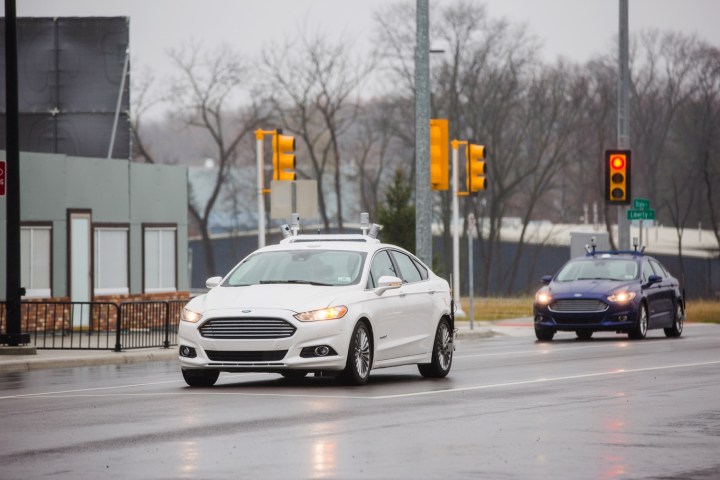
The company unveiled its first self-driving Fusion Hybrid prototype in 2013, and recently announced plans to test similar cars on public roads in California, and at the Mcity simulated city operated by the University of Michigan. Fusion Hybrids will become a more common sight in both locales, as Ford plans to add 20 cars, bringing the total fleet to about 30 vehicles. Ford says this is the most of any carmaker.
These cars will use Velodyne’s new Solid-State Hybrid Ultra Puck lidar sensor. Named for its hockey puck-like size and shape, the Ultra Puck is lighter and more compact than previous lidar units from Velodyne, which has been supplying autonomous-car researchers for years. Ford says the Ultra Puck is small enough to be mounted on a car’s sideview mirror, greatly streamlining packaging.
Lidar, which emits pulses of light instead of the radio waves used by radar, has become a critical component in the battery of sensors that allow self-driving cars to see their surroundings. Spinning lidar units of various sizes can be seen mounted on the roofs and other areas of many autonomous prototypes. Reducing the size of this equipment will make integrating autonomous features easier.
At CES, Ford reiterated a previously-stated goal of building a car that can drive itself with no human intervention. At the company’s press conference, Ford CEO Mark Fields added that this car may be developed for use in a car-sharing or ride-sharing service. He claimed the entire auto industry is worth $2.3 trillion today, while car-sharing companies, taxi companies, and other mobility services (not all of them automotive) are worth $5.4 trillion. Ford wants a piece of that action.
What Fields didn’t touch on was a rumored partnership with Google. The possibility of a joint Ford-Google announcement at CES was first reported about two weeks ago, but Fields would not confirm whether Ford is working with the search giant, which of course has considerable experience with self-driving cars.
Updated 11/12/16
A report released this week claims Ford may work with Google to develop a separate business unit for autonomous. The carmaker is still in talks with Google, according to The Wall Street Journal, and may also create a separate business unit to develop autonomous cars specifically for ride-sharing services and fleets. The arrangement would see Ford develop software and hardware relevant to the vehicles itself, while Google would apply its autonomous-drive control software, the report said.


